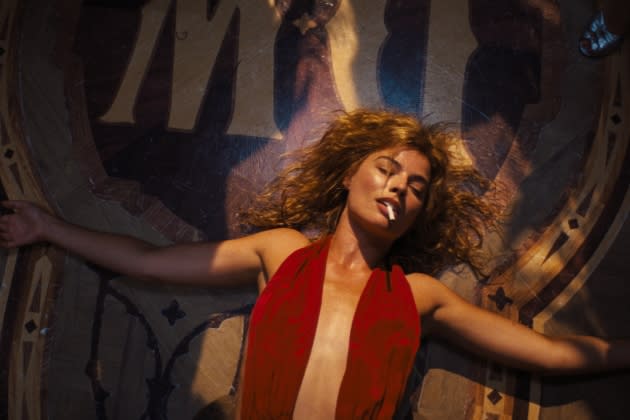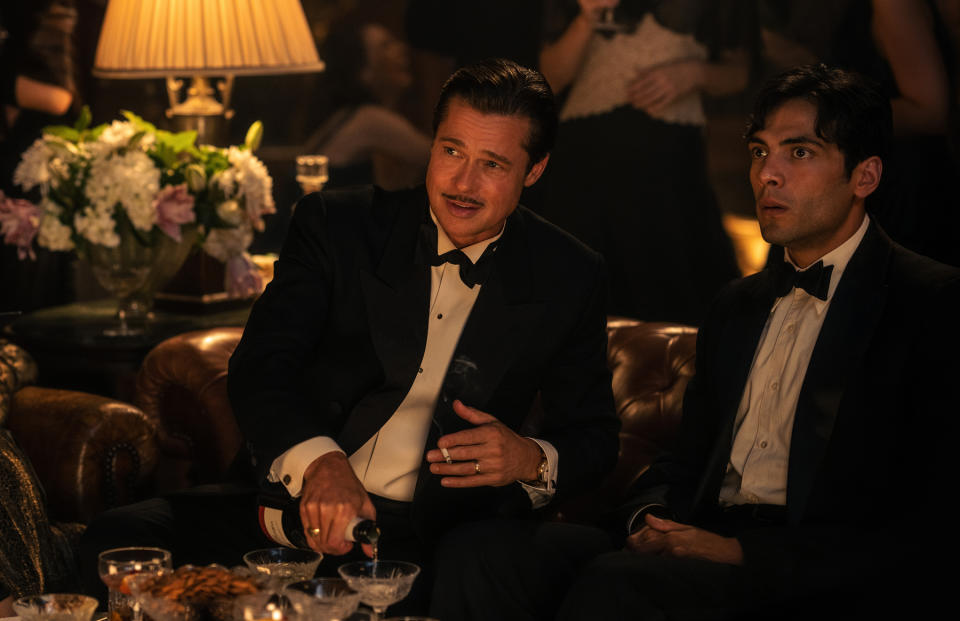‘Babylon’ Is a Lame Hollywood Orgy of Sex, Drugs, and Margot Robbie

Damien Chazelle’s Babylon, in theaters Dec. 23, is a movie that should probably hit harder than it does. It is yet another of this year’s magic of the movies movies, flying under the guise of something decidedly more ambivalent. It is a tribute to the joyous and nasty realities of the silent era and its transition into the professionalism and modernity of the sound era, with all the detours about the nature of stardom, the inherent democracy of a pop art form, and the inglorious underbellies of L.A. that such a story, given epic proportions, can demand. It takes some of the basic formula of Chazelle’s similarly nostalgic La La Land — benchwarmer man on the verge of his big break meets and falls for a natural born star; their paths cross and re-cross; their fates tell the story of a city and its moment — and paints it back onto a pair of Hollywood dreamers in the late 1920s, played by Margot Robbie and Diego Calva. It does this amid plentiful tributes to the history of Hollywood, starting with its title, which, in the context of a movie whose opening scenes involve elephant diarrhea and a Fatty Arbuckle avatar being peed on at a party, can’t help but evoke Kenneth Anger’s notoriously scandalous Hollywood Babylon, a bible of 20th century Tinseltown gossip. Brad Pitt plays the cherry on top: a drowning man. He’s an actor named Jack Conrad, meant to evoke the silent era titans John Gilbert or Douglas Fairbanks. He shows up to make pitiful speeches about why movies matter as he waits out the slow death of a career that no longer matters: his own.
How can it be that so much happens as so little of it feels genuinely dangerous? Part of the problem has to be that Babylon is an emotionally cryptic tribute to Hollywood and its movies that’s too much of a tribute and not enough of an actual, thriving movie. It’s good when it’s showing off; when it isn’t, it doesn’t seem to know what to do. You can feel that we’re being encouraged to think, at least in part, about the present, when cries over the long-term demise of the movie industry feel less like a threat than like a guarantee. Certainly you can feel where the movie’s coming from — you can feel that we’re being encouraged to think, at least in part, about the present, when even the most hopeful sentiments that get characters by Babylon — such as the idea that movies are a way for their stars to live forever — feel a little naive. The characters in Babylon cling to ideas that, in our current moment of streaming content mills, with their glaring absences and disincentivized regard for the past, reveal such hope to be a losing game in the long term. Babylon is an up-and-down semi-romance, perhaps first and foremost. But beyond that the movie is tracking a series of interwoven transitions: silent to sound, the creep of political morality, the shapeshifting meaning of celebrity as media changes over time, and on and on, ideas that are still relevant to the present day because the shapeshifting never stopped and the transitions only led to more changes, more of the industry swaying under its denizens’ feet. The movie should hit harder because a prurient party-fest with dark undertones of creeping irrelevance and impermanence seems ready-made to thrill us, if not move us.
More from Rolling Stone
Jean Smart on Being a 'Smartass,' Her Secret Admirer Harry Styles, and Sex With Brad Pitt
Margot Robbie Is the Reigning Queen of a Bright Pink Paradise in 'Barbie' Teaser Trailer
Babylon runs into a problem that Chazelle’s work has been guilty of before. Beneath its lacquered finish of romantic sincerity and its thoroughly educated nostalgia for film history, its (again nostalgic) technical polish, and its inarguable ambition to make the all-encompassing Los Angeles epic relevant again, is a movie that feels damningly phony. Its gutsy prurience often collapses down into muddled emptiness, fun gags that get wasted. It hems its romantic leads into a story that feels increasingly vague. Its panache begins to feel more like the idea of panache — like a bodysnatcher lurking under a skin of actual cinematic style, all empty gestures and wiry nothingness. The disappointment is that the movie wields so much and achieves so relatively little.
Somehow, this is all also what’s redeemable about the project. I’m not convinced that Babylon thinks its as good as the Hollywood past that it so dutifully refuses to sanitize. The opposite feels more true. Extended nods to the history of silent cinema and, most notably of all, to Singing in the Rain — that beloved musical about exactly the transition from silent to sound that Babylon also tracks — are knowingly, humbly insufficient. Babylon‘s head is bowed. The movie is neither wholly devoted to being a period picture nor glammed up in punk anachronism like, say, Marie Antoinette. Instead, it’s wholeheartedly casual, fun enough to know that there’s wisdom to be had in making its characters feel more modern than we might expect, and smart enough to know that there’s no point in trying to be anything more than the approximation that it will always be. Which makes for a more interesting movie than the alternative. There’s freedom in the idea. There may even be a little self-loathing.
Robbie and Calva star as Nellie LaRoy, a dynamo nobody who very quickly becomes a somebody thanks in part to a happy bit of fate and good timing, and Manny Torres, a Mexican American man starting from the bottom of an industry that only sees a chosen few rise to the top. They meet by chance at a party, in the first of the movie’s several long set pieces involving a revolving door of cast-members and shouty, brash incidents — a freewheeling “Welcome to the Copa” sequence extended to a brazen-seeming thirty minutes. Interesting people float in and out. Jovan Adepo recurs as Sidney Palmer, a stylish jazz trumpeter who floats at the margins of the story until he doesn’t. Li Jun Li gives us a cabaret singer, Lady Fay Zhu, who even more interestingly has a gig writing the intertitles for silents — and whose skill at this bestows LaRoy her initial name and persona as a “wild child.” We get Jean Smart as Elinor St. John, a writer for the breathlessly sensationalistic Photoplay magazine, and on and on — Olivia Wilde and Katherine Waterston as women who make the unfortunate choice of marrying Pitt’s Conrad, Spike Jonze as a chaotic German director, Jeff Garlin, Tobey Maguire, and a weirdly good Flea. The story strains to be as big as Hollywood, Altmanesque with dialogue and mishaps, keen on the power of mixed fates, people falling from grace, ascending to the heights of fame, or one and then the other.
Predictability is part of the game, here. LaRoy believes that she is a star and is of course right about that. The movie sops up her star-making debut turn — a scene in which all she has to do is show up and flirt with some men and then cry ad nauseum, both of which she excels at. Chazelle, of course, allows the scene to grow into a bulbous, extended endeavor, flying beyond the mere demands of the plot to really let us sit with this star being born. Manny’s origin story is a little less interesting, and he’s less interesting overall, a basic good guy amid monsters. But again you can see the turns coming. She starts high, he starts low, then they inevitably switch, and tango, and tussle around until they’re both somewhere dead center, but ultimately down on their luck.

This, as the stars on every side of them are trying to make sense of the changing world of movies. Babylon is never better than when it nerds out. When Chazelle is diving into the chaos of the silent era, he’s onto something. A great early set piece takes us to a silent movie set, which is really a collection of sets and disasters waiting to happen because there is no sound: actors working on different movies can scream at the top of their lungs because it will make no difference. And forget worker protections. The whirligig filming of a battle scene features a collection of Skid Row drunkards all, apparently, wielding real weapons; the segment ends with a tracking shot across the battle-wounded and the revelation that one guy’s dead. Indeed, the best bit in the movie involves its body count: people died for this, it was the Wild West out there. That’s bad and also sort of deliciously strange; the movie earns its sickened chuckles.
Compare this to another of the movie’s better scenes: Nellie’s first time on a sound set, and all the differences from the silent world that Chazelle neatly and effectively piles into the scene for the sake of a few good, informative gags. This stuff works because you can feel the care and interest on the movie’s end; these bits are just thematic decor, but are rather at the core of the movie. This is less true of the movie’s more untidy gags, the poop and piss and vomit and on and on, which just feel like corny punchlines, boyish showing off, but without nearly the sense of exuberance it needs. The movie isn’t really that nasty. It’s more notable for wanting to be. There’s a strained attempt at zaniness to Babylon, a radical uncoolness to its desire to impress us by showing how well it knows other, better directors’ moves. (Hail Caesar’s on-set antics feel like more than a minor inspiration for much of what’s here — but unpacking all of Babylon‘s references would, maybe to its credit, take all day.) The impersonal vagueness of the characters doesn’t help, and it’s not really satisfying to see them as pure archetypes. Seeing a character inevitably pick up a gun and take his life, no one will be surprised — if anything, it feels a bit too much like going through the motions of a preordained arc.
Does Babylon care about the world it depicts? Yes, but only so far. A telling scene involving the degradation of a character being asked to don blackface tells us something. The scene is ugly because it should be — that’s the reality that the movie is chipping away at. But the moment is over as soon as it starts. The character, a Black man, walks away — wipes his hands and face clean and leaves the business, exiting the movie for most of its remaining runtime. The movie is good at reminding us about the work of women directors during the silent era, and of the primacy of people at the margins overall, the women and minorities, the queer lovers and outright, rat-eating weirdos. But it all seems to amount to a gallery of also-rans in a world most devoted to its Jacks and Nellies. That’s an ugly but still-fascinating fact. And Babylon pretends to be about ugliness — it conflates being gross with being ugly. But when the going gets tough, it takes the easy way out, pushing the margins back into the margins. It’s enough for this movie to be able to notice that reality. A better movie might have done something with it.
Best of Rolling Stone


